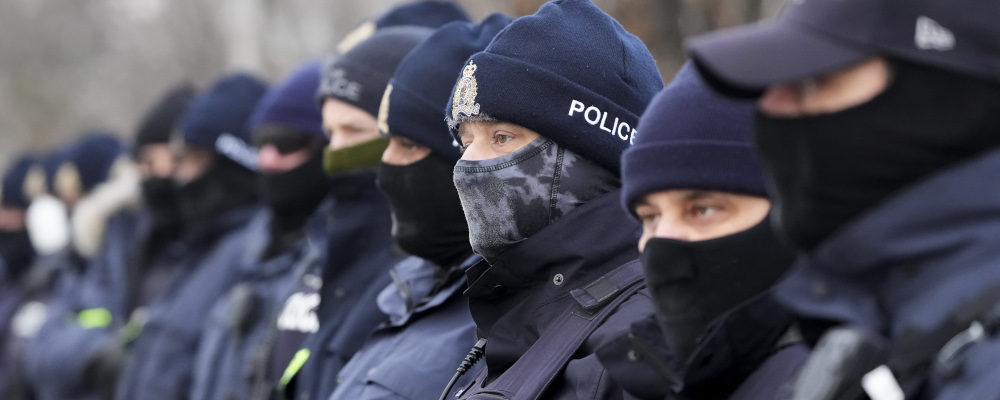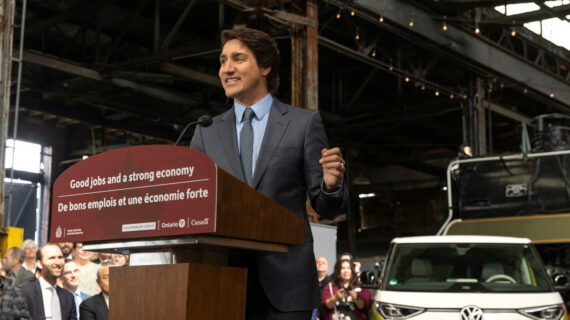Shortly after Justin Trudeau invoked the Emergencies Act, The New York Times tweeted a story with the headline: “Declaring a national public order emergency is Trudeau’s most aggressive response since the crisis began. The move will allow him to temporarily suspend civil liberties to reopen border crossings and clear the blockade of about 400 trucks in Ottawa.”
Very Online Canadians quickly bombarded the Times saying to say, in more and less polite terms, that their headline was incorrect. CBC host Rosemary Barton lead the charge, tweeting: “This is completely false. In no way does this suspend civil liberties. Good grief.”
The Times duly deleted its tweet and replaced it with this: “Correction: An earlier tweet incorrectly suggested that Trudeau would temporarily suspend civil liberties. We deleted the incorrect tweet.”
Not surprisingly, a 280 character tweet didn’t capture the full complexity of a legal response to a national emergency, and there are reasonable quibbles with the Times’s wording. At a stretch, it could be read to imply Trudeau had authorized a blanket suspension of all civil liberties, creating a lawless zone for the federal government. That’s not the best reading of the tweet—frankly, it’s barely a plausible reading—but in the current febrile environment, I can see why the Times would want to correct even such a strained impression.
But Rosemary Barton’s tweet was also wrong, and more obviously misleading than the original New York Times tweet. Here are four reasons why.
First, the government quickly announced measures that can be reasonably described as, at the very least, interfering with civil liberties. Things like cancelling people’s vehicle insurance, instructing banks to share information about their customers with security and intelligence agencies, and asking banks to “freeze or suspend an account without a court order.” All without the hassle of due process.
Second, legal analysts have described how the Emergencies Act gives the federal government new powers to end the protests. On the CBC, Leah West, a professor at Carleton University who literally (co-)wrote the book on emergency legal powers in Canada (and who is skeptical that the Emergencies Act applies in this case), suggested that the federal government could use its new powers to order tow truck drivers to provide services to the government that they are currently reluctant to provide.
On the same CBC segment, Wesley Wark, of the Centre for International Governance Innovation (who believes Trudeau is justified in invoking the Act), said “the most important power [the Act] gives the federal government is the ability to define a place, a zone, that has to be secured and preventing people from coming into or out of that zone until it is cleared.” (For the record, Mr. Wark expects that, despite what Trudeau has said, “we will see a call for the military to aid the civil authorities in bringing this protest to an end” because “military support in terms of tactics, heavy equipment, intelligence support, surveillance and so on is going to be so important.”)
Neither of these new federal powers can be exercised without interfering with civil liberties, specifically the ability of a private company to decline to participate in police or military action and the normal ability to come and go on a public street. Maybe you think these are minor and understandable limits on civil liberties. Depending on the exact circumstances, I might agree. But that wasn’t the question.
Third, a lot of people on Twitter, including some lawyers and government representatives who should know better, have pointed to the fact that the preamble to the Emergency Act name-drops the Charter as proof that actions taken under it cannot suspend or violate civil liberties. Specifically, the preamble says:
AND WHEREAS the Governor in Council, in taking such special temporary measures, would be subject to the Canadian Charter of Rights and Freedoms and the Canadian Bill of Rights and must have regard to the International Covenant on Civil and Political Rights, particularly with respect to those fundamental rights that are not to be limited or abridged even in a national emergency;
This is not exactly the gotcha response those people think it is. To start with, any action by the government is subject to the Charter regardless of what a specific statute’s preamble says. It should be pretty obvious to everyone that the government can’t evade the Charter simply by conveniently neglecting to mention it in the preamble to a law granting it extraordinary powers. But the confusion runs deeper.
The Charter itself does not determine the scope of the rights or freedoms it guarantees, let alone civil liberties that it does not purport to protect. (Infamously, property rights, which are important for the exercise of many civil liberties, are not explicitly protected by the Charter.) This means the Charter is not a clear guide that tells the government what it can and can’t do in a given situation. It just provides a list of rights and freedoms, stated at a high level of abstraction, which it says are guaranteed “subject only to such reasonable limits prescribed by law as can be demonstrably justified in a free and democratic society.”
This leaves a lot to be worked out in practice, a lot of scope for reasonable disagreement, and a lot of potential for governmental overreach (though, more often, it results in governmental underreach). Most importantly for our purposes, that caveat about “reasonable limits” means that government action may limit civil liberties and still be justified under the Charter.
Fourth, and finally, a declaration of emergency must be laid before parliament within seven sitting days, but it comes into effect at the time it is declared. This gives the government, and any law enforcement or military support it enlists to help it, at least a week to take actions that exceed the powers it has under existing legislation without parliamentary approval.
If Parliament eventually confirms the declaration, the government’s actions are retroactively validated; if Parliament rejects the declaration, however, that does not, and cannot, undo whatever the government did without Parliament’s approval in the intervening week. The dangers of that legal void are compounded by the fact that section 47 of the Act shields the government, and anyone acting in good faith under a declaration of emergency, from liability for the actions they took pursuant to the order while it was in effect.
Twitter wars aside, Trudeau’s declaration of emergency gives the federal government new powers that make it easier for the government to act to end the Ottawa protests. (If it didn’t, then why declare it?). This includes the power to act in ways that are more likely to interfere with civil liberties than would be possible using existing legal powers. The government presumably thinks those extra powers are justified; it may also think that temporarily suspending some people’s civil liberties is justified; and in some cases it may even be right.
But the bottom line is that civil liberties in Canada are more vulnerable today than they were yesterday, and they will remain so as long as the declaration of emergency remains in place.




